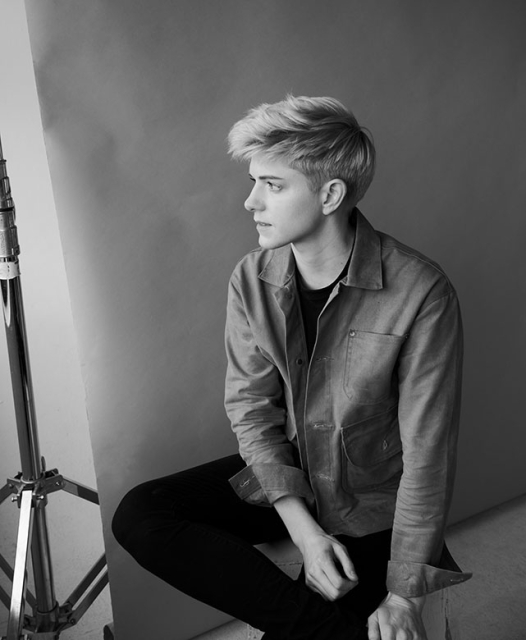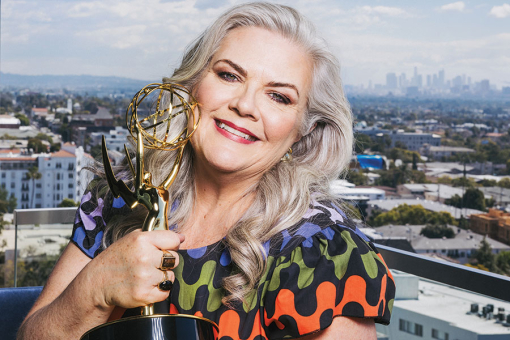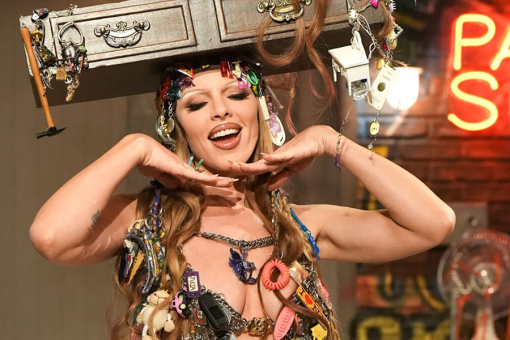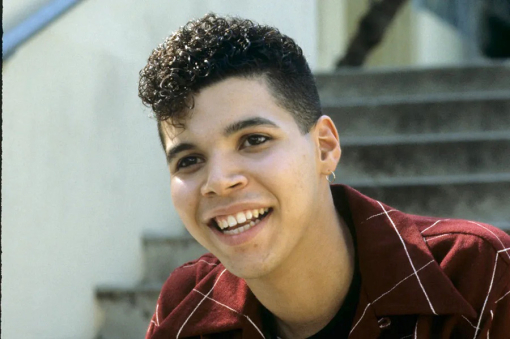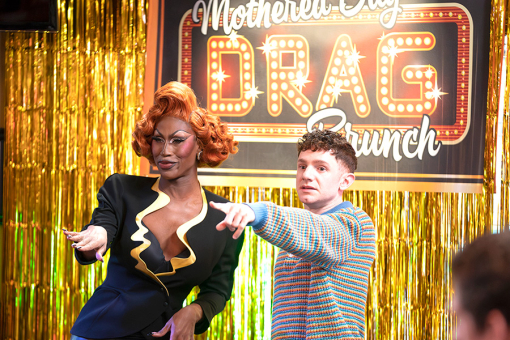Mae Martin has nothing to hide.
Her Netflix series, Feel Good, which just dropped its second season, hits very close to the truth of Martin's life. Sometimes a series which uses real names and situations from a performer's life allow the audience to feel as if they know the person. In this case, Martin says, it may be true. She says, "The thing is you probably do and that's the bizarre thing. Yeah, it's pretty truthful so I feel like people do actually know me a little bit now, which is nice."
The series tells the story of a stand up comedian who is a former addict, and follows her as she falls in love, falls off the wagon, and finds her way in life. Martin says she started opening up in her own stand-up, and it eventually morphed into the series.
She notes, "I think it was a gradual process where it started with my stand up just noticing that's a more vulnerable - I was seeing that more people were connecting with it. It's such an instant barometer when you do stand up. You can gauge right away the reaction. So I was just finding that more and more I was writing more personal things.
"And then with the show initially, I wanted the character to have a different name. I didn't want the character to be called Mae and we had different ideas, and then it just sort of gradually became more and more authentic.
"I think season two is probably more personal than season one. Season one is where I was at about 10 years ago, with addiction and various things. But season two really feels like the character's figuring it out in real time with me. So, yeah, it's pretty wild."
The transition is a natural one, according to Martin, "In season one, those external things are causing problems in the relationship. They're dealing with the external things like drugs or my girlfriend's character's repression and things like that.
"And then in season two, those things are stripped away so they have to deal with the things that are at the root of those causes. And so I think by nature, that is going to end up being a little bit more personal."
Martin says that the plan was always to limit the series to two seasons. She explains, "I guess it's a British thing as well. And I guess it was more that we [Martin and co-writer Joe Hampson] knew exactly what we wanted those two seasons to be. And the thought of just continually throwing problems at that couple was so - seems so sadist - like seems really sadistic in a way. It always appealed to us, the idea of just telling a complete love story.
"I mean, there's still some ambiguity at the end I think. But we wanted to leave them in a good place, where you feel like they could potentially figure it all out. And it's nice to walk away from it and be like, 'oh, I've done the best I can with that,' and on to the next thing.
"I hope it's satisfying for people who were invested in that relationship after season one. We wanted it to be satisfying enough for them, also realistic about adult relationships,"
Getting the tone right depended in large part on casting the right actors. Martin explains, "Well, me and my co-writer Joe, I think we knew so clearly what we wanted the tone of the show to be. And it's a particular tone because we really wanted it to be a comedy/drama and in the truest sense where it could be really absorbed in one moment. And then in the same scene could hit you with an emotional gut punch.
"So it's tricky casting someone like that because if you're pulling from just a comedy pool of actors, you have to be careful that you're also going to get the emotional stuff and vice versa. So, yeah, we just went through a really long process with it, but I just can't believe the people that said that they'd do it.
"I can't believe Lisa Kudrow did it. I'm still shocked about it and, yeah, just some amazing people. And we knew the whole time that we wanted Charlotte Ritchie to play George. And she's a friend so it was really amazing to be able to write for someone who you already know their rhythms and the way that they move through the world, so that was exciting."
Another challenge in getting the tone right was in making sure that the characters were complete people, not good guys or bad guys, and that both the comedy and drama were served in each situation.
Martin says, "That's the stuff I like to watch. And I also think that that's the most true to life because you can be in the most awful situations, and then someone says something darkly funny. I think life is full of humor and tragedy in equal measure.
"I think one thing is we wanted to make sure there were no good guys and bad guys, and that you can have empathy towards these characters who on paper were highly problematic.
"I mean, with Mae and George, I think people's allegiance switches per episode, I hope anyway, that in one, you really feel for George. And then in the next, you want to shake them. That I think, hopefully, with casting, that appeals to people as well to play parts that were not black and white like that."
Martin, originally from Canada and living in the UK, has been doing stand up comedy since she was 13 years old. She says, "In Toronto, I started taking improv classes at Second City. And then I just got completely obsessed and started doing shows. I think I got a lot of work early on just because of the novelty of my age, so it snowballed quite quickly to where I was doing three or four shows a week.
"And then, I just was completely obsessed. I still am. I'm still just this huge comedy fan. I have a lot of affection for the comedy community and the comedy world. I hope that comes through in the show even though I also look at the darker side of it, and all that stuff."
That said, taking time out from stand up to do Feel Good was something of a needed break. Martin explains, "To be honest, being able to make Feel Good has been an amazing kind of break as well. This, year that's the longest I've gone without doing stand up since I was 13. And it definitely has been nice to be less nocturnal, but I do really miss getting in - it's the green rooms that I love.
"And it's weird because on the one hand, I guess that scene sort of introduced or it has an element of danger to it for a teenager. But it also - my love for it also totally brought me out of a lot of darkness as well.
"On my days off, I still go and watch comedy. I just - I love it. Not all of it but the good stuff. It's so good. It just makes me feel human and connected. And it's always the things that are frightening to say out loud, or that you think, 'oh no, one's going to relate to this.' And it's just so weird, and then you say it out loud, and that's the thing that people really go, 'oh my God, me too.' And they really connect to it."
Another way Martin has connected to her audience is in writing a book for young people, Can Everyone Please Calm Down?: A Guide to 21st Century Sexuality. She explains, " I wrote it a couple of years ago now. But it's something that was based on a previous stand up show I did called Us. But it was about labels, and how I wish they weren't as much of a thing.
"And the publishers said, 'what's the book that you wish you had when you were 14?' So I tried to approach it like that and - I don't know. I think some of these topics like - well, definitely right now. I don't know about in the States, but I presume it's similar to in the UK; it's like the issues around gender and things are becoming so politicized and fraught, and we just forget that it's a very human thing.
"We're talking about a very small population that's at risk. And so to take that highly politicized edge off of it, and just try and remember we're talking about things like love and things that can be lighthearted as well. And so I tried to make it funny.
"And I think the minute people feel like you're trying to teach them something, they just clam up. And so with Feel Good especially Joe and I, that was never our intention at all. We just wanted to tell a good love story and not shy away from being really specific, and trust that people across all demographics would connect to the more, yes, the universal things about love."
For the immediate future, Martin has a number of projects coming up. She says, "I really miss stand up. And I had an hour of stand up ready to go right when the pandemic hit. So I'm just getting that up on its feet again, that show, and seeing if any of it is still relevant and working towards a new stand up show and stand up tour.
"And then I'm developing a new thing with Netflix. And I got a couple other things in development, but none of them are concrete yet. It's a nebulous time, but I've got a lot of irons in the fire."
More articles celebrating Pride Month.


